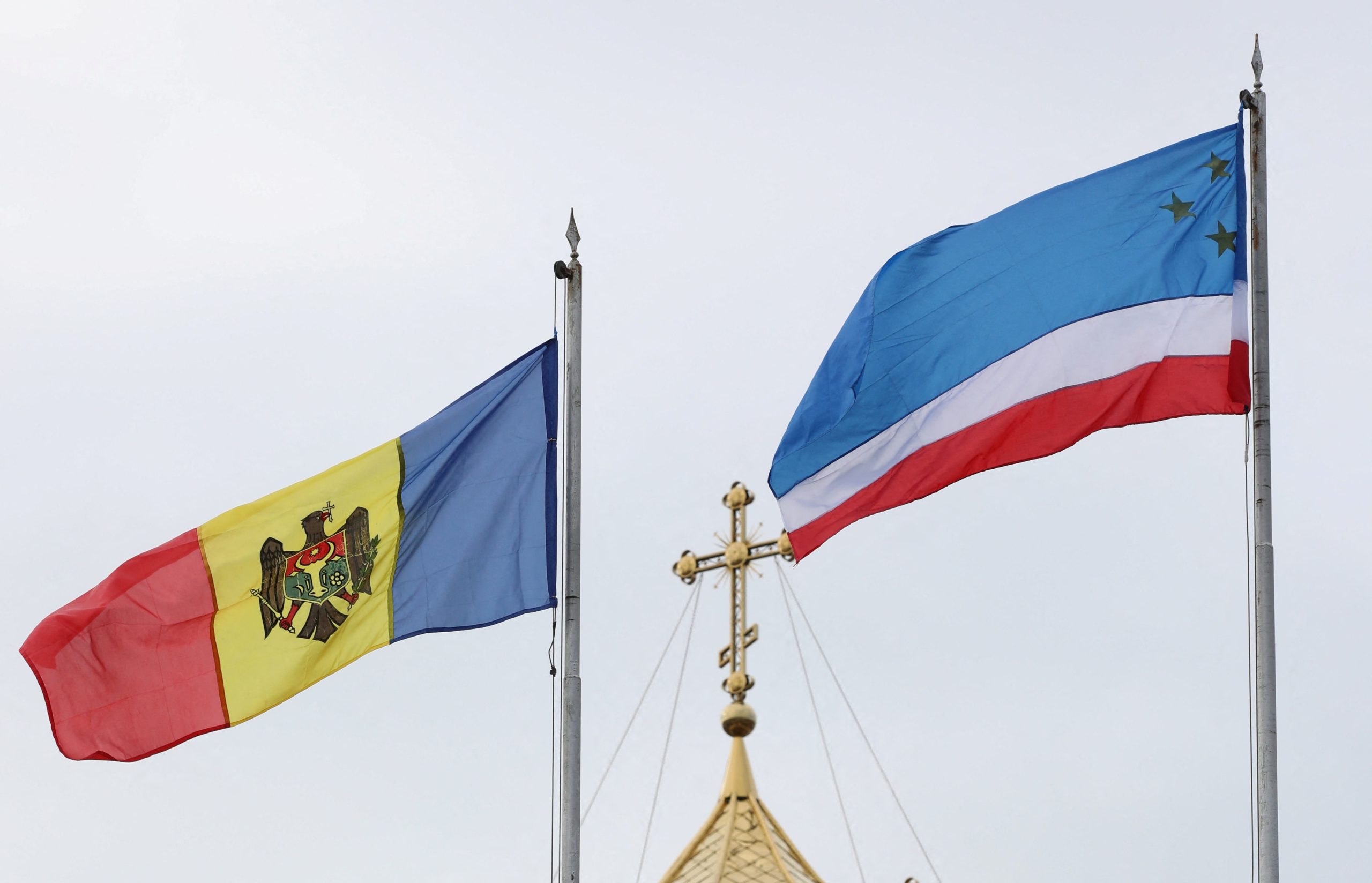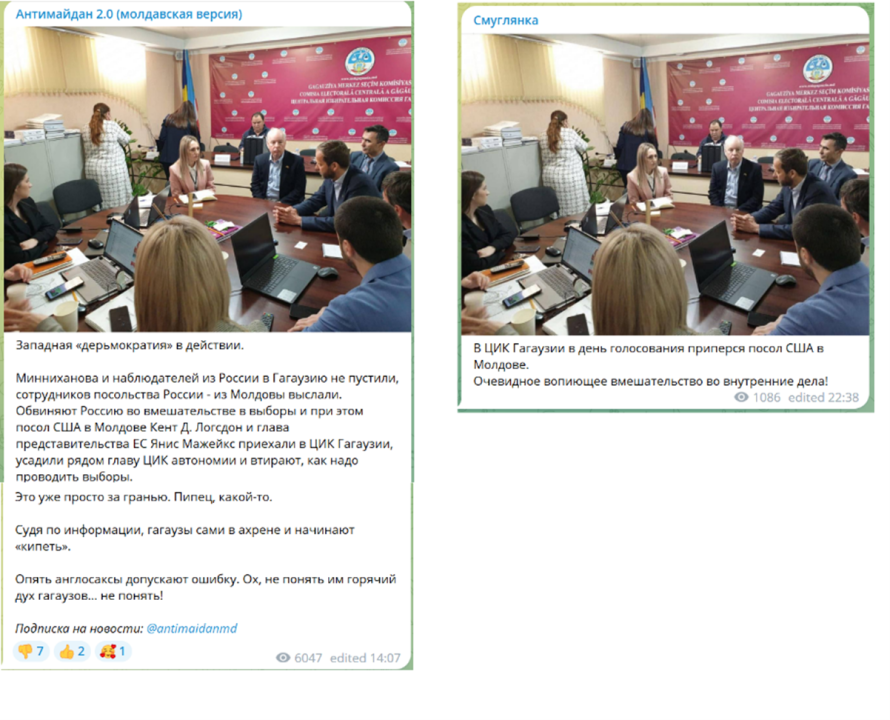A Russian footprint in Moldovan regional elections
Pro-Russian Telegram channels attempt to influence the voting process in Moldova’s Gagauzia Autonomous Territory
A Russian footprint in Moldovan regional elections
Share this story

BANNER: Flags of Moldova and the autonomous region of Gagauzia fly next to a church in Comrat, the capital of Gagauzia. (Source: Reuters /Vladislav Culiomza)
On May 14, 2023, residents of the Gagauzia Autonomous Territory in southern Moldova go to the polls to elect their new governor for the next four years. This event of local significance might otherwise go unnoticed, but Russia is using it as a means of interfering with and influencing the internal politics of the Republic of Moldova.
Gagauzia is an autonomous region with about 130,000 residents, mostly from the Orthodox Turkish Gagauz minority. The local population was heavily Russified during Soviet times; as a result, most of them speak Russian instead of their native language. Gagauzia is often regarded as Moldova’s second-most pro-Russian region after Transnistria. In 2014, against the Moldovan government’s intention to sign the Association Agreement with the European Union, Gagauz authorities conducted an illegal referendum in which the locals overwhelmingly favored Moldova joining the Russian-led Customs Union.
Historically, relations between Gagauzia and the central Moldovan government have been tense, especially regarding geopolitical issues. Locals see Russia as a defender of their interests and a protector of Moldova’s sovereignty and, contrary to Moldova’s foreign policy, strongly support closer ties with Russia over the European Union.
As Russian is the primary language spoken in Gagauzia, a majority of the population has easy access to Russian media, thus being largely exposed to pro-Kremlin narratives. In Gagauzia, cable television operators re-broadcast Russian TV stations, their political programs, and news, even though the Moldovan central authorities have prohibited re-broadcasts and suspended the licenses of six of these channels for inciting hatred, war, and discrimination. Despite the Russian invasion of Ukraine, Gagauzia residents remain strongly pro-Russian.
Before the first round of the elections on April 30, there was a diplomatic incident involving Rustam Minnikhanov, president of Russia’s Republic of Tatarstan, who was heading to Gagauzia to attend a conference organized by one of the candidates. The border police, however, did not allow him to enter the country. Moldovan legislation does not allow the involvement of foreign actors and countries in electoral campaigns. As a result of the incident, Moldova expelled a diplomat from the Russian embassy in Chisinau.
Shor Party candidate Eugenia Gutul and Socialist Party candidate Grigorii Uzun won the first round of voting and will now face each other in a final runoff election on May 14. Both candidates are exponents of the main pro-Russian opposition parties and openly promote pro-Kremlin narratives, including maintaining a hostile attitude toward the Moldovan central authorities and denouncing any idea of European integration for the Republic of Moldova.
Igor Dodon, the former president of Moldova, frequently accompanied Uzun during his electoral campaign. There were a number of incidents during their meetings with Gagauz voters that sparked outrage in Chisinau. Dodon, for instance, was caught on camera during a town hall meeting talking about the importance of close cooperation with Russia, reassuring the locals, “Don’t give up. Everything will be fine. Ours (the Russians) are already close.” Dodon also promised to bring Russian President Vladimir Putin to Gagauzia if he is elected, which was met with cheers by the local audience.
Shor Party candidate Eugenia Gutul also professed pro-Russia sentiment during her electoral campaign. She had discussions with high-ranking Russian officials, including Leonid Slutsky, Chairman of the Committee on International Affairs of the State Duma of the Russian Federation, who supported her candidacy. Four Russian pop stars, including Ilan Shor’s wife Jasmin, Philip Kirkorov, Nikolai Baskov, and Stas Mikhailov, all publicly endorsed Gutul.
Russian media extensively covered the election campaign in Gagauzia, offering airtime to the candidates. The candidates, in turn, have used these platforms to launch attacks and accusations against the Moldovan authorities regarding their anti-Russian policy.
Besides political issues, the last two weeks of the electoral campaign, were marked by a pro-Kremlin narratives claiming that the European Union and United States were attempting to influence the Gagauzia elections. On April 30, and immediately afterward, several Telegram channels released and shared pictures of the US and EU ambassadors visitinh the Gagauzia electoral authority to observe the voting process. The authors of these widely shared posts claimed that the ambassadors’ presence demonstrated meddling in the region’s internal affairs and that they were trying to influence the outcome of the elections.
For instance, on April 30, Telegram channel Молдавская политика (“Moldova Politics”) posted a picture featuring the US and EU ambassadors alongside the sarcastic caption, translated from Russian, “Chip and Dale. More specifically, US Ambassador Kent D. Logsdon and EU Ambassador Janis Mazeiks visited the Central Committee of Gagauzia. Are they contemplating? Or are they plotting something nasty?”

An hour later, another channel called Соросята Гагаузии (“Soros puppets of Gagauzia”) published a post with the headline “US and EU want to deprive Gagauzia of fair elections.” The article claimed without any supporting evidence that “at the suggestion of Western embassies,” incumbent governor Irina Vlah and Gagauz Central Electoral Commission head Yana Kovalenko allegedly had a “tough and explicit dialogue” with the ambassadors to manipulate the election results. The post was then picked up by another Telegram channel, Антимайдан 2.0 (молдавская версия) (“Anti-Maidan 2.0 (Moldovan version)”), whose stated goal is to “Reveal the plans of the Anglo-Saxons.”

Anti-Maidan 2.0 (Moldovan version) later posted another picture showing the ambassadors conversing with the electoral committee of Gagauzia, calling it “Western ‘shitocracy’ in action.”
They continued: “[Tatarstan President] Minnihanov and observers from Russia were not allowed into Gagauzia; the employees of the Russian embassy were expelled from Moldova. They accuse Russia of interfering in the elections, and at the same time, US Ambassador to Moldova Kent D. Logsdon and the head of the EU Delegation Janis Mazeiks arrived at the electoral committee of Gagauzia; they seated the head of the committee next to them and were explaining how elections should be held. This is beyond the limit. The Anglo-Saxons made a mistake again.”
Later on the same day, the channel Смуглянка (“Smuglianka”) reposted the picture, saying, “The US Ambassador to Moldova visited the Electoral Commission of Gagauzia on the voting day. An obvious and blatant interference in internal affairs!”

To clarify and dispel speculation, the Electoral Commission of Gagauzia later offered additional context in a statement saying that both Logsdon and Mazeiks were registered by the central electoral authority as international observers for April 30 election. Under the Electoral Code of Gagauzia, “National and international observers accredited by the relevant electoral bodies have the right to be present at all meetings of the electoral bodies, as well as during the counting of votes and summarizing the results of the voting, and during all electoral procedures.”
Later that evening, the Telegram channel Молдавская политика forwarded a post by Socialist MP Bogdan Tirdea that said, “It’s almost 11 p.m., and there are no election results in Gagauzia. Even preliminary. It seems that the EU and US ambassadors signed up not only as observers. They also count the votes!”
Two days later, on May 2, the Telegram channel Gagauznews – Новости Гагаузии quoted an article by RIA Novosti, a Russian government-funded media outlet, under the headline, “Foreign diplomats influenced the election of the head of Gagauzia, one of the candidates believes.” The article referred to the statements by Victor Petrov, who was running for governor of Gagauzia. “We believe that the significant effect on the dynamics of the election results on April 30 was the unconcealed influence of foreign politicians and diplomats, which we all saw on the day of the vote, as well as the inadmissibility of the Russian observers to the electoral process,” he stated.
On the same day, Moscow accused Chisinau of unfriendly behavior. Russian Foreign Ministry Spokesperson Maria Zakharova stated, “Chisinau acted unfriendly, not allowing Russian observers to participate in the elections in Gagauzia.” She added that the foreign ministry is closely following the processes in the Gagauzia Autonomous Territory, which has close “cultural, humanitarian, spiritual, trade, economic, and interregional ties” with the Russian Federation. Zakharova emphasized that the Kremlin hopes that the newly elected leadership of the region will continue “the line of developing traditional ties with Russia.”
Over the following week, the theory of alleged external meddling in the Gagauzia elections further expanded. In a new twist, several anonymous Telegram channels accused the “Romanian-American regime in Moldova” of seeking to remove the Shor Party candidate from the election after the National Anticorruption Center conducted a series of criminal proceedings in a voter corruption case, including searches of the offices of the Shor Party.
Referring to the situation, on May 7, Telegram channel Молдавский Vагон (“Moldavan Wagon”) posted the comment, “We have ‘good news’ from the Romanian-American Sandu regime. The leaders of Eugenia Gutul’s campaign headquarters and the leaders of the territorial organization of the Shor party were detained… Just in time for the second round of elections… The Romanian-American regime in Moldova is in agony!”
On May 9, the same channel asserted once more that “the Romanian-American regime in Moldova is acting in a lawless manner.” The post noted that Moldovan police notified the Central Electoral Commission of Gagauzia that morning about violations during the electoral process involving Shor Party candidate Eugenia Gutul. Thus, she may be excluded as a gubernatorial candidate during the second round of elections.
While the Russian Federation was directly and indirectly involved in the electoral campaign in Gagauzia through various state officials, politicians, artists, and more, their proxies in Moldova are also trying to manipulate public opinion into believing that the US and EU are interfering in the affairs of the region. This supports the common pro-Kremlin narrative that the Republic of Moldova’s current government is acting at the West’s command and that the US and EU are the ones who rule in Moldova. By manipulating the facts and amplifying these narratives, they are potentially laying the groundwork for additional influence campaigns in Moldova’s general local elections this fall.
Cite this case study:
Victoria Olari, “A Russian footprint in Moldovan regional elections,” Digital Forensic Research Lab (DFRLab), May 12, 2023, https://dfrlab.org/2023/05/12/a-russian-footprint-in-moldovan-regional-elections.

